Over the last five years, China has made marked progress in protecting the rights and interests of people with disabilities.
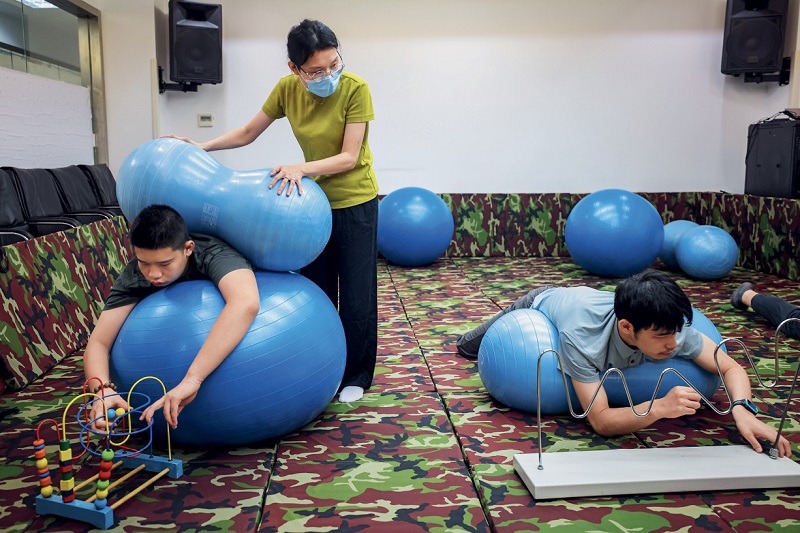
A community in Nanjing provides rehabilitation services for people with disabilities on August 29, 2023.
Helping people with disabilities enjoy a happier and higher-quality life is an important manifestation of the Communist Party of China (CPC)’s purpose of wholeheartedly serving the people and an inevitable objective of China’s socialist system.
Nowadays, the 85 million people with disabilities in China are finding a stronger sense of fulfillment, happiness, and security. Their conditions and standards of living have increased together with the level of their access to basic public services. The multi-level social security system has been improved at the same time, all of which has enabled them to easily and equally participate in social life.
In recent years, the life of China’s disabled people has achieved a comprehensive advancement and reached a new level of development, obtaining an expanding international influence.
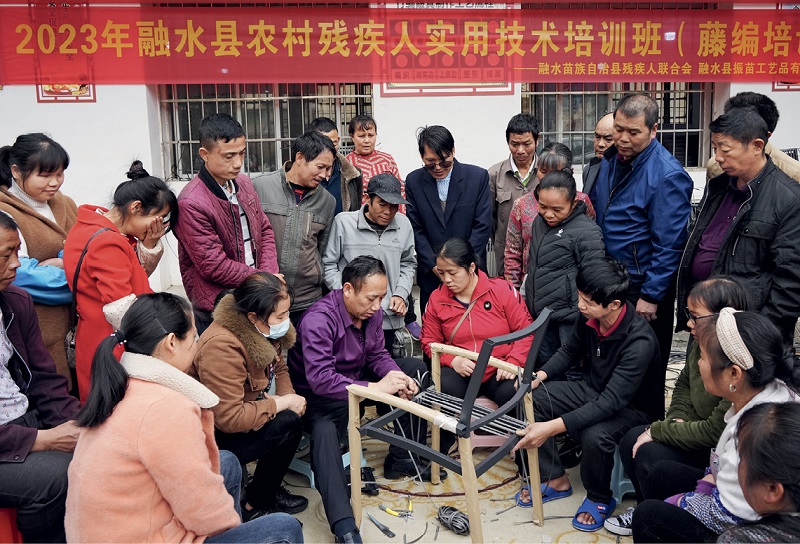
People with disabilities learn rattan weaving skills at an employment assistance base at Rongshui Miao Autonomous County, Liuzhou City, Guangxi Zhuang Autonomous Region, on March 1, 2023.
More Employment for More Opportunities
“Wheat straw is a common material that we can use to make a beautiful craft. By making straw paintings, I can earn RMB 3,000-4,000 each month now. I also have many apprentices, which makes me very proud,” said Wang Jitian at the first workshop for women with disabilities in Zhumadian City, Henan Province.
Wang had had a difficult life after she dropped out of school at an early age due to a disability. Later, after hearing about a free training course in straw painting organized by the local workshop, she immediately availed herself of the opportunity and studied hard. Now she can independently make many patterns such as flowers, animals, and calligraphy. “We must seize this opportunity and study hard to learn excellent skills,” Wang said.
Employment is critical to people’s livelihood. For people with disabilities, it is even more significant as it is not only related to their development and survival, but it is also a fundamental way for them to integrate into society and fulfill their dreams.
At present, there are 18 million people with disabilities of working age in China. In 2022, the State Council issued a work plan to promote the high-quality employment of these people, and it is expected to provide one million new job positions for them in both urban and rural areas by 2024. It has also drawn up 10 action plans to this end.
China has strengthened vocational training to improve disabled people’s skills for working and doing entrepreneurship. In rural areas, China has established and improved the training system of entrepreneurship. Based on innovation parks, it has cultivated the entrepreneurial skills of migrant workers and people with disabilities. In urban areas, it has provided training courses to equip people with disabilities with labor skills. Local governments have included employment for disabled people in the sector of public services. Governments at the provincial, prefectural, and county levels have set up special service agencies for this community. For blind people, the government also supports massage training, other forms of employment and start-up business.
China has also expanded employment channels for people with disabilities. In recent years, China has taken measures to encourage government agencies, public institutions, and state-owned enterprises to take the lead in hiring people with disabilities. It has launched online platforms for employers to report the proportion of people with disabilities in their staff as required by the law. It has urged employers to recruit people with disabilities for targeted positions as well. Through these measures, the employment of people with disabilities has significantly increased.
Meanwhile, China has implemented preferential government procurement, tax incentives, and other supportive policies to promote the collective employment of people with disabilities. Through the establishment of an employment counselor system, it has also helped people with severe physical and mental disabilities to participate in work.
During the past five years, the number of people with disabilities at work has increased by more than 300,000 each year. By the end of 2022, nearly 9.1 million people with disabilities were employed in urban and rural areas. At present, the 3,508 employment assistance bases for disabled people nationwide have provided 45,000 jobs, boosting the incomes of 80,000 families.
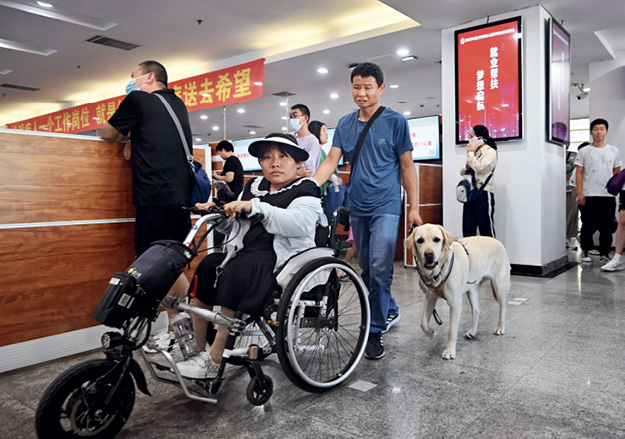
College graduates with disabilities attend an employment fair held in Hebei Province’s Shi-jiazhuang City on July 25, 2023.
Consolidating Poverty Reduction Achievement
Luo Yuanzhong is a resident of physical disability in Longling Village, Ganzhou City, Jiangxi Province. With the help of the local federation for disabled people, Luo has been able to rise above poverty by livestreaming marketing. Now he is a local online celebrity with more than 400,000 followers online. “I hope to promote the specialties of my hometown to all parts of the country, so that more people with disabilities can increase their income,” Luo said.
Affected by their physical disabilities, limited working ability, and low education level in general, poverty stricken disabled people have always been a special group, which face the greatest difficulty in getting rid of poverty and have the highest rate of returning to poverty. During the process to eradicate extreme poverty, the Chinese government adopted targeted measures and made extra efforts to help this group get rid of poverty. As of 2021, 7.1 million registered people with disabilities living in poverty were lifted out of poverty as scheduled. The family income of these individuals increased from RMB 2,824 in 2015 to RMB 10,384 in 2021, an increase of 2.7 times, creating a miracle in the history of human poverty reduction for disabled people.
To consolidate the achievement in poverty elimination and advance rural revitalization, China has improved its policies to meet the basic and special needs of disabled people, to ensure their wellbeing.
By the end of June 2023, the recipients of living allowances for poor people with disabilities and nursing subsidies for severely disabled persons had exceeded 11.6 million and 15.4 million respectively.
By the end of 2022, more than 27.6 million people with disabilities had been covered by basic old-age insurance, and nearly 12.1 million of them had received pensions. Among those under the age of 60, more than 6.9 million with severe disabilities and nearly 2.9 million with non-severe disabilities received financial assistance for subscribing to insurance.
China’s nursing services for people with disabilities have also made steady progress. There are 8,906 institutions with boarding and day care services for 155,000 disabled people, and there are also home care services for 472,000 disabled people.
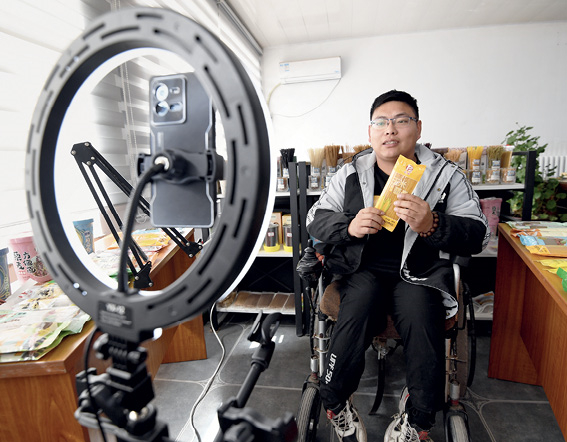
A person with physical disability sells food products online in Chicheng City, Hebei Province, on March 24, 2023.
Improving the Care Service System
“Rehabilitation training gives me hope and full confidence in my future,” said Xiaohua (pseudonym), a person with congenital cerebral palsy in Lipo Village, Xinjie Town, Tianchang City, Anhui Province.
Due to a severe disability of both of her lower limbs, Xiaohua could not take care of herself and could only stay at home. During the second half of 2021, staff members of a local federation for disabled people learned about her situation and encouraged her to take rehabilitation training and psychological counseling in the service center.
After more than one year of training under the guidance of the doctor, Xiaohua has improved the mobility of her legs, as well as her balance and ability to take care of herself. Now, she can leave her home and work in the village.
Over the past five years, China has improved the care service system for people with disabilities by enhancing the quality and effectiveness of the services for them.
Rehabilitation is the greatest need of these people. By the end of 2022, 407,000 children with disabilities had received recovery assistance services. China has also focused on low-income rural residents with disabilities, and put efforts to improve targeted services for their rehabilitation. In this way, nearly 8.6 million disabled people were able to have access to basic rehabilitation services, and more than 1.6 million received basic assistive devices. Meanwhile, China has increased the building of rehabilitation institutions and training of their medical personnel. By the end of 2022, China had established 11,661 rehabilitation institutions for the disabled with 328,000 employees.
Education is important for the all-round development and better integration into society of people with disabilities. Over the past five years, special education has received more government support and become more accessible. At the same time, China has made major efforts to develop inclusive education. At present, the enrollment rate of children with disabilities in compulsory education has reached 95 percent. More and more people with disabilities have taken the college entrance examination to pursue higher education.
Over the past five years, China has also provided high-quality cultural services for people with different disabilities. At the end of 2022, there were 24 special radio programs and 37 sign language TV programs at the provincial level. Public libraries at all levels have set up 1,377 reading rooms for Braille and audio books. The disabled people federations at the provincial and prefectural levels have also set up 229 art troupes. These have greatly enriched the cultural life of people with disabilities.
Steps have also been taken in organizing sports events for the disabled. At the 2022 Beijing Winter Paralympics, the Chinese delegation won the first place in both the gold table and the medal table with 18 gold medals, 20 silver medals, and 23 bronze medals, achieving its best performance at the Winter Paralympics. Meanwhile, rehabilitation and fitness sports for them have been promoted. China has carried out a series of actions to help them participate in sports, recovery programs, and fitness activities, so as to help them regain confidence and courage in life.
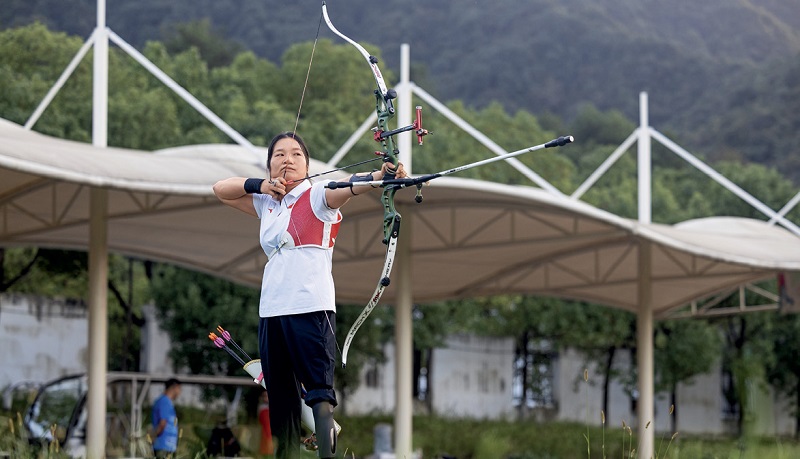
Ye Jinyan, the archery champion at the Incheon 2014 Asian Para Games, is training for Hangzhou Asian Para Games on October 8, 2023.
Equal Participation in Social Life
A new law on building barrier-free living environments took effect on September 1, 2023. It guarantees the equal, all-round, and convenient participation and integration of the disabled and elderly groups in social life, promoting the sharing of the fruits of economic and social development by all the people.
“This fully reflects the attention the government pays to the vulnerable groups as well as the concept of people-centered development,” said Shi Hong, head of the Social Law Office of the Legislative Affairs Commission, the National People’s Congress Standing Committee.
The Chinese government has long attached great importance to the protection of the rights and interests of people with disabilities, guaranteeing their rights in the Constitution, the Civil Code, and the Law on the Protection of Disabled People. China has expanded channels for them to participate in China’s democratic process, supporting more people with disabilities, their relatives, and people working in the disability service sector to enter the legislature and political advisory bodies at all levels.
Over the past five years, China has built more barrier-free facilities during the renovation of old urban communities and the construction of new urban residential communities.
Last year, the Marrakesh Treaty came into effect in China, which has further guaranteed the equal rights of the people who are blind, visually impaired, or otherwise print disabled to enjoy work and receive education. China has also implemented measures that enable people with disabilities to travel easier, such as promoting barrier-free transport, issuing guidelines on barrier-free services at airports, and providing online booking for special railway seats.
Besides, China has accelerated the construction of barrier-free facilities in financial, postal, and tourism sectors, and implemented national standards for barrier-free information on Internet and mobile terminals. It has also promoted the barrier-free transformation of Internet applications, in order to ensure that people with disabilities can share the conveniences of the information society.
Today, China has conscientiously fulfilled its obligations under the Convention on the Rights of Persons with Disabilities and worked toward the goals set in the United Nations 2030 Agenda for Sustainable Development related to people with disabilities. As a result, China’s achievements in protecting the rights and interests of these people have been recognized throughout the world.
Recent relevant international meetings such as aforementioned ones deepened exchanges on disability affairs under the frameworks of Asia-Pacific Economic Cooperation (APEC), Asia-Europe Meeting (ASEM), and China-Africa cooperation. Chinese wisdom and solutions are helping promote the development of international disability affairs. 
CHEN JINSONG is a reporter with the overseas edition of People’s Daily.